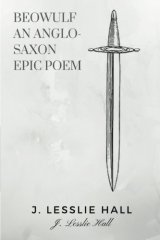Beowulf Page #4
Beowulf is an Old English epic poem consisting of 3,182 alliterative lines. It is one of the most important works of Old English literature. The date of composition is a matter of contention among scholars; the only certain dating pertains to the manuscript, which was produced between 975 and 1025.
~Onela~.--Brother of Ohthere.--3615; 4039. ~Ongentheow~.--King of Sweden, of the Scylfing dynasty. Married, perhaps, Elan, daughter of Healfdene.--3526; 4116. ~Oslaf~.--A Dane of Hnæf's party.--1824. ~Ravenswood~.--The forest near which Hæthcyn was slain.--4031; 4041. ~Scefing~.--Applied (14) to Scyld, and meaning 'son of Scef.' [xvii] ~Scyld~.--Founder of the dynasty to which Hrothgar, his father, and grandfather belonged. He dies, and his body is put on a vessel, and set adrift. He goes from Daneland just as he had come to it--in a bark.--14; 119; 127. ~Scyldings~.--The descendants of Scyld. They are also called Honor-Scyldings, Victory-Scyldings, War-Scyldings, etc. (See 'Danes,' above.)--21; 71; 81. ~Scylfings~.--A Swedish royal line to which Wiglaf belonged.--362. ~Sigemund~.--Son of Wæls, and uncle and father of Fitela. His struggle with a dragon is related in connection with Beowulf's deeds of prowess.--1438; 1447. ~Swerting~.--Grandfather of Higelac, and father of Hrethel.--1911. ~Swedes~.--People of Sweden, ruled by the Scylfings.--3513. ~Thrytho~.--Wife of Offa, king of the Angles. Known for her fierce and unwomanly disposition. She is introduced as a contrast to the gentle Hygd, queen of Higelac.--2842; 2856. ~Unferth~.--Son of Ecglaf, and seemingly a confidential courtier of Hrothgar. Taunts Beowulf for having taken part in the swimming-match. Lends Beowulf his sword when he goes to look for Grendel's mother. In the MS. sometimes written Hunferth. 91; 1841. ~Wæls~.--Father of Sigemund.--1460. ~Wægmunding~.--A name occasionally applied to Wiglaf and Beowulf, and perhaps derived from a common ancestor, Wægmund.--366; 3861. ~Weders~.--Another name for Geats or Wedergeats. ~Wayland~.--A fabulous smith mentioned in this poem and in other old Teutonic literature.--783. ~Wendels~.--The people of Wulfgar, Hrothgar's messenger and retainer. (Perhaps = Vandals.)--630. ~Wealhtheow~.--Wife of Hrothgar. Her queenly courtesy is well shown in the poem.--1055. ~Weohstan~, or ~Wihstan~.--A Wægmunding, and father of Wiglaf.--361. ~Whale's Ness~.--A prominent promontory, on which Beowulf's mound was built.--3852; 4276. ~Wiglaf~.--Son of Wihstan, and related to Beowulf. He remains faithful to Beowulf in the fatal struggle with the fire-drake. Would rather die than leave his lord in his dire emergency.--361; 363; 3628. ~Wonred~.--Father of Wulf and Eofor.--4120; 4126. ~Wulf~.--Son of Wonred. Engaged in the battle between Higelac's and Ongentheow's forces, and had a hand-to-hand fight with Ongentheow himself. Ongentheow disables him, and is thereupon slain by Eofor.--4119; 4129. ~Wulfgar~.--Lord of the Wendels, and retainer of Hrothgar.--618; 630. ~Wylfings~.--A people to whom belonged Heatholaf, who was slain by Ecgtheow.--86; 816. ~Yrmenlaf~.--Younger brother of Æschere, the hero whose death grieved Hrothgar so deeply.--214. [xviii] LIST OF WORDS AND PHRASES NOT IN GENERAL USE. ATHELING.--Prince, nobleman. BAIRN.--Son, child. BARROW.--Mound, rounded hill, funeral-mound. BATTLE-SARK.--Armor. BEAKER.--Cup, drinking-vessel. BEGEAR.--Prepare. BIGHT.--Bay, sea. BILL.--Sword. BOSS.--Ornamental projection. BRACTEATE.--A round ornament on a necklace. BRAND.--Sword. BURN.--Stream. BURNIE.--Armor. CARLE.--Man, hero. EARL.--Nobleman, any brave man. EKE.--Also. EMPRISE.--Enterprise, undertaking. ERST.--Formerly. ERST-WORTHY.--Worthy for a long time past. FAIN.--Glad. FERRY.--Bear, carry. FEY.--Fated, doomed. FLOAT.--Vessel, ship. FOIN.--To lunge (Shaks.). GLORY OF KINGS.--God. GREWSOME.--Cruel, fierce. HEFT.--Handle, hilt; used by synecdoche for 'sword.' HELM.--Helmet, protector. HENCHMAN.--Retainer, vassal. HIGHT.--Am (was) named. HOLM.--Ocean, curved surface of the sea. HIMSEEMED.--(It) seemed to him. LIEF.--Dear, valued. MERE.--Sea; in compounds, 'mere-ways,' 'mere-currents,' etc. MICKLE.--Much. NATHLESS.--Nevertheless. NAZE.--Edge (nose). NESS.--Edge. NICKER.--Sea-beast. QUIT, QUITE.--Requite. RATHE.--Quickly. REAVE.--Bereave, deprive. SAIL-ROAD.--Sea. SETTLE.--Seat, bench. SKINKER.--One who pours. SOOTHLY.--Truly. SWINGE.--Stroke, blow. TARGE, TARGET.--Shield. THROUGHLY.--Thoroughly. TOLD.--Counted. UNCANNY.--Ill-featured, grizzly. UNNETHE.--Difficult. WAR-SPEED.--Success in war. WEB.--Tapestry (that which is 'woven'). WEEDED.--Clad (cf. widow's weeds). WEEN.--Suppose, imagine. WEIRD.--Fate, Providence. WHILOM.--At times, formerly, often. WIELDER.--Ruler. Often used of God; also in compounds, as 'Wielder of Glory,' 'Wielder of Worship.' WIGHT.--Creature. WOLD.--Plane, extended surface. WOT.--Knows. YOUNKER.--Youth. [1] BEOWULF. I. THE LIFE AND DEATH OF SCYLD. {The famous race of Spear-Danes.} Lo! the Spear-Danes' glory through splendid achievements The folk-kings' former fame we have heard of, How princes displayed then their prowess-in-battle. {Scyld, their mighty king, in honor of whom they are often called Scyldings. He is the great-grandfather of Hrothgar, so prominent in the poem.} Oft Scyld the Scefing from scathers in numbers 5 From many a people their mead-benches tore. Since first he found him friendless and wretched, The earl had had terror: comfort he got for it, Waxed 'neath the welkin, world-honor gained, Till all his neighbors o'er sea were compelled to 10 Bow to his bidding and bring him their tribute: An excellent atheling! After was borne him {A son is born to him, who receives the name of Beowulf--a name afterwards made so famous by the hero of the poem.} A son and heir, young in his dwelling, Whom God-Father sent to solace the people. He had marked the misery malice had caused them, 15 [1]That reaved of their rulers they wretched had erstwhile[2] Long been afflicted. The Lord, in requital, Wielder of Glory, with world-honor blessed him. Famed was Beowulf, far spread the glory Of Scyld's great son in the lands of the Danemen. [2] {The ideal Teutonic king lavishes gifts on his vassals.} 20 So the carle that is young, by kindnesses rendered The friends of his father, with fees in abundance Must be able to earn that when age approacheth Eager companions aid him requitingly, When war assaults him serve him as liegemen: 25 By praise-worthy actions must honor be got 'Mong all of the races. At the hour that was fated {Scyld dies at the hour appointed by Fate.} Scyld then departed to the All-Father's keeping Warlike to wend him; away then they bare him To the flood of the current, his fond-loving comrades, 30 As himself he had bidden, while the friend of the Scyldings Word-sway wielded, and the well-lovèd land-prince Long did rule them.[3] The ring-stemmèd vessel, Bark of the atheling, lay there at anchor, Icy in glimmer and eager for sailing; {By his own request, his body is laid on a vessel and wafted seaward.} 35 The belovèd leader laid they down there, Giver of rings, on the breast of the vessel, The famed by the mainmast. A many of jewels, Of fretted embossings, from far-lands brought over, Was placed near at hand then; and heard I not ever 40 That a folk ever furnished a float more superbly With weapons of warfare, weeds for the battle, Bills and burnies; on his bosom sparkled Many a jewel that with him must travel On the flush of the flood afar on the current. 45 And favors no fewer they furnished him soothly, Excellent folk-gems, than others had given him
Translation
Translate and read this book in other languages:
Select another language:
- - Select -
- 简体中文 (Chinese - Simplified)
- 繁體中文 (Chinese - Traditional)
- Español (Spanish)
- Esperanto (Esperanto)
- 日本語 (Japanese)
- Português (Portuguese)
- Deutsch (German)
- العربية (Arabic)
- Français (French)
- Русский (Russian)
- ಕನ್ನಡ (Kannada)
- 한국어 (Korean)
- עברית (Hebrew)
- Gaeilge (Irish)
- Українська (Ukrainian)
- اردو (Urdu)
- Magyar (Hungarian)
- मानक हिन्दी (Hindi)
- Indonesia (Indonesian)
- Italiano (Italian)
- தமிழ் (Tamil)
- Türkçe (Turkish)
- తెలుగు (Telugu)
- ภาษาไทย (Thai)
- Tiếng Việt (Vietnamese)
- Čeština (Czech)
- Polski (Polish)
- Bahasa Indonesia (Indonesian)
- Românește (Romanian)
- Nederlands (Dutch)
- Ελληνικά (Greek)
- Latinum (Latin)
- Svenska (Swedish)
- Dansk (Danish)
- Suomi (Finnish)
- فارسی (Persian)
- ייִדיש (Yiddish)
- հայերեն (Armenian)
- Norsk (Norwegian)
- English (English)
Citation
Use the citation below to add this book to your bibliography:
Style:MLAChicagoAPA
"Beowulf Books." Literature.com. STANDS4 LLC, 2025. Web. 6 Mar. 2025. <https://www.literature.com/book/beowulf_945>.








Discuss this Beowulf book with the community:
Report Comment
We're doing our best to make sure our content is useful, accurate and safe.
If by any chance you spot an inappropriate comment while navigating through our website please use this form to let us know, and we'll take care of it shortly.
Attachment
You need to be logged in to favorite.
Log In